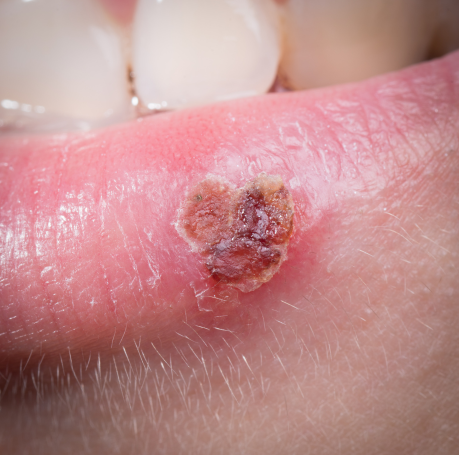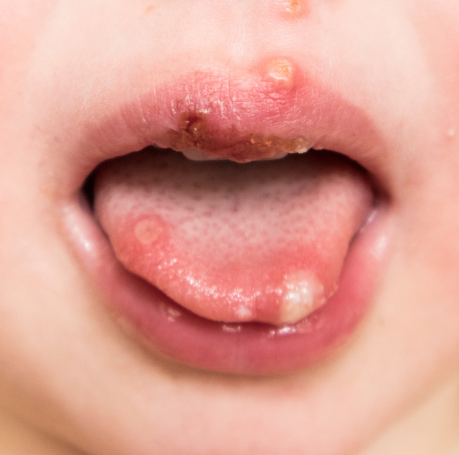
Herpes is one of the most common viruses that affect humankind. Yet, it remains misunderstood and stigmatized.
Most people associate this virus with genital herpes, but did you know that there’s another type of herpes that’s just as common and equally contagious?
We’re talking about cold sores, those pesky blisters that appear on or around the lips. If you’ve ever had one, you know how uncomfortable and embarrassing they can be.
But did you also know that cold sores are caused by the herpes simplex virus (HSV)?
In fact, HSV-1 is the virus responsible for most cases of cold sores. While it’s true that cold sores are not as serious as genital herpes, they’re still a form of herpes and can be transmitted through skin-to-skin contact. In this article, we’ll explore the truth about herpes and how cold sores are related to this common virus.
We’ll also discuss the symptoms, treatments, and prevention strategies for cold sores, so you can stay informed and protect yourself and your loved ones.
Table of Contents
Are Herpes Cold Sores? The different types of herpes viruses
There are two types of herpes viruses, HSV-1 and HSV-2. HSV-1 is the virus responsible for most cases of cold sores, while HSV-2 is responsible for most cases of genital herpes. While both types of herpes can cause sores or blisters on the skin or mucous membranes, they are different viruses with different symptoms and treatment options.
HSV-1 is typically transmitted through oral-to-oral contact, such as kissing or sharing utensils or drinks. It can also be transmitted through oral-genital contact, but this is less common. Once a person is infected with HSV-1, the virus remains in their body for the rest of their life.
HSV-2, on the other hand, is primarily transmitted through genital-to-genital contact, such as during vaginal or anal sex. It can also be transmitted through oral-genital contact. Like HSV-1, once a person is infected with HSV-2, the virus remains in their body for the rest of their life.
Symptoms of a herpes outbreak
The symptoms of a herpes outbreak can vary depending on the type of herpes and the location of the infection. In general, the first outbreak of herpes is the most severe, with subsequent outbreaks being milder.
Symptoms of a herpes outbreak can include:
– Pain, itching, or burning in the affected area
– Small, red bumps or blisters that break open and form sores or ulcers
– Swollen lymph nodes in the groin, neck, or armpit
– Flu-like symptoms, such as fever, headache, and muscle aches
– Painful urination (if the infection is in the genital area)
The symptoms of a herpes outbreak typically last for 2-4 weeks, but the virus remains in the body and can cause future outbreaks.
TRENDING – Herpesyl Review – An In-depth Look into the Benefits – What Can You Expect from Taking Herpesyl?
What are cold sores and how are they related to herpes?
Cold sores, also known as fever blisters, are a common symptom of HSV-1 infection. They typically appear as small, red blisters on or around the lips, but they can also occur inside the mouth or on the nose, chin, or cheeks. Cold sores are highly contagious and can be spread through close contact, such as kissing or sharing utensils or drinks.
Cold sores usually heal on their own within 7-10 days, but antiviral medications can help to reduce the severity and duration of the outbreak. Cold sores can also be triggered by stress, illness, or sun exposure.
While cold sores are not as serious as genital herpes, they are still a form of herpes and can be transmitted through skin-to-skin contact. It’s important to avoid close contact with others when you have a cold sore to prevent the spread of the virus.
How common is herpes and who is at risk?
Herpes is a very common infection, with an estimated 3.7 billion people under the age of 50 infected with HSV-1. Genital herpes is less common, with an estimated 417 million people between the ages of 15 and 49 infected with HSV-2.
Anyone who is sexually active can be at risk for herpes, but certain factors can increase the risk of infection. These include having multiple sexual partners, having unprotected sex, and having a weakened immune system.
Herpes can also be transmitted from a mother to her baby during childbirth, which can be a serious and potentially life-threatening complication. Pregnant women who have a history of herpes should inform their healthcare provider so they can take steps to prevent transmission to their baby.
Diagnosis and treatment options for herpes
Herpes can be diagnosed through a physical exam and a laboratory test, such as a blood test or a culture of the sore or blister. While there is no cure for herpes, antiviral medications can help to manage symptoms and reduce the frequency and severity of outbreaks.
Antiviral medications such as acyclovir, valacyclovir, and famciclovir can be taken orally or applied topically to the affected area. These medications work by slowing down the replication of the virus and reducing the severity of the symptoms.
It’s important to start antiviral treatment as soon as possible after the onset of symptoms to be most effective. Your healthcare provider can help you determine the best treatment plan for your individual needs.
Living with herpes: coping strategies and support groups
Living with herpes can be challenging, both physically and emotionally. It’s important to take care of yourself and seek support from others who understand what you’re going through.
Coping strategies for living with herpes may include:
– Educating yourself about the virus and how it’s transmitted
– Practicing safe sex to prevent transmission to others
– Managing stress through exercise, meditation, or therapy
– Seeking support from a therapist or support group
– Being honest with sexual partners about your herpes status
There are also many online support groups and forums where people with herpes can connect and share their experiences. These resources can be a valuable source of support and information for people living with herpes.
Debunking common myths about herpes
There are many myths and misconceptions about herpes that can contribute to stigma and shame. Here are some common myths about herpes, debunked:
– Myth: Herpes is always accompanied by visible symptoms.
– Fact: Herpes can be transmitted even when there are no visible symptoms, a condition known as asymptomatic shedding.
– Myth: Only promiscuous people get herpes.
– Fact: Herpes can happen to anyone who is sexually active, regardless of their number of partners.
– Myth: Herpes is a punishment for promiscuity or immoral behavior.
– Fact: Herpes is a viral infection that can happen to anyone, regardless of their sexual behavior or morality.
– Myth: You can only get herpes from someone who has visible symptoms.
– Fact: Herpes can be transmitted even when there are no visible symptoms, a condition known as asymptomatic shedding.
– Myth: Herpes is only transmitted through sexual contact.
– Fact: Herpes can be transmitted through skin-to-skin contact, including kissing or sharing utensils or drinks.
Preventing the spread of herpes
The best way to prevent the spread of herpes is to practice safe sex and avoid close contact with others when you have an outbreak. Here are some tips for preventing the spread of herpes:
– Use condoms or dental dams during oral, vaginal, or anal sex.
– Avoid sexual contact when you have an outbreak or when you feel symptoms coming on.
– Wash your hands frequently and avoid touching your face or mouth.
– Avoid sharing utensils, drinks, or personal items with others.
– Inform sexual partners about your herpes status before engaging in sexual activity.
Pictures of Cold Sores




Conclusion: Understanding and managing herpes
Herpes is a common viral infection that affects millions of people worldwide. While it can be uncomfortable and embarrassing, it’s important to remember that herpes is a manageable condition. With the right treatment and support, people with herpes can live healthy and fulfilling lives.
If you think you may have herpes or have questions about herpes, talk to your healthcare provider. They can help you understand your options and develop a treatment plan that’s right for you. Remember, knowledge is power, and the more you know about herpes, the better prepared you’ll be to manage the condition and prevent its spread.